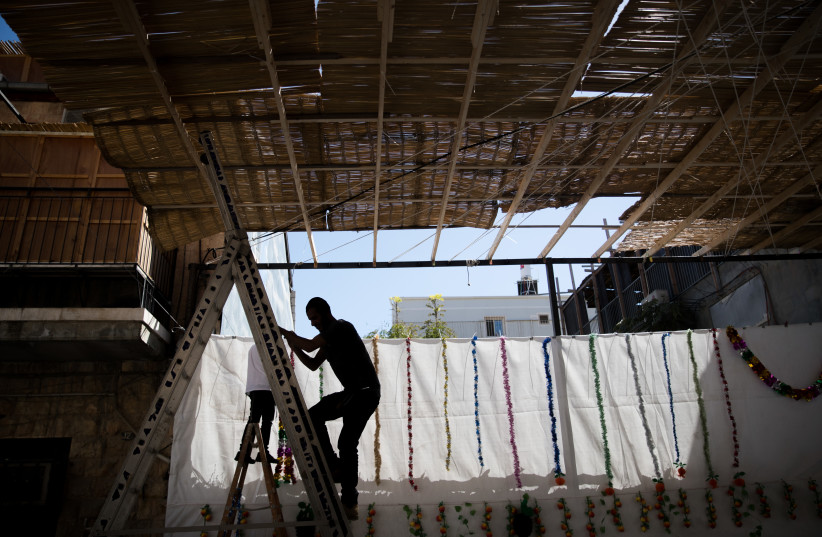Sukkot is one of my favorite holidays to celebrate in Israel. Here are six reasons:
The ‘sukkot’
Growing up in Kansas, my Sukkot memories revolve around the annual tradition of gathering at my bubby and zayde’s house. Without fail, my zayde would construct a magnificent wooden sukkah in the backyard, fashioning it with bamboo bars for s’chach.
My siblings and I eagerly created colorful artwork and paper chains with Bubby that ultimately adorned the sukkah walls. Then, Zayde, clad in his white holiday robe like an angel, would take each of us individually. He would guide us in shaking the lulav and etrog with his big gentle hands, and we would recite the blessings.
I can still vividly recall those moments: Zayde turning the etrog in his hands, explaining the significance of shaking the lulav, to the four corners of the world, and teaching me that God’s presence knows no bounds – He is everywhere.
During that period, my world had a limited scope. It revolved around my immediate family residing in Overland Park and our small Jewish community. The only sukkah I knew was on my bubby and zayde’s back porch.

Today, I am fortunate to live in Jerusalem, and my sukkah is just one among the tens of thousands scattered across the Jewish state. As I step outside my sukkah, instead of seeing a sliding glass door and a brick wall, I am greeted by the sight of my neighbors’ sukkot and those of their neighbors. This panoramic view is truly spectacular and fills me with gratitude for the existence of the Jewish state that unites us as a people and, on a personal level, appreciation for the privilege of calling Israel my home.
The sounds
One of the fantastic aspects of having so many sukkot in the neighborhood is the ability to hear the beautiful sounds emanating from them. I love the echoes of fathers reciting the Kiddush, the melodic voices of bar mitzvah boys leading Birkat Hamazon, and the harmonious singing of families together around the table.
It’s the rhythmic rustle of lulavs. The banter of friends. The heartfelt toasts.
The scents
Sukkot is a big yellow etrog, exuding an intoxicating and invigorating freshness. The fragrant herbs intertwined with the earthy scents of persistent weeds that inevitably creep along the fence’s edge. It’s the bouquet my husband surprised me with for our holiday table, mingling with the pungent scent of mosquito-repellent candles and generous spritzes of bug repellent I’ve sprayed on the children.
It’s also the aroma of the food, brought outdoors to share with family and friends, wafting into neighboring sukkot. The hearty and comforting foods of fall: apple and pumpkin pies, sweet beets, caramelized onions, and sweet potatoes.
The story
On Sukkot, we read from the Book of Zechariah, which describes an international uprising against Jerusalem and the near destruction of the Jewish people. But in the final hour, “when it seems that all hope will be gone for Jerusalem and the people of Israel,” God fights for His people. He “smite(s) all the people that have fought against Jerusalem” and ushers in an era of peace.
“Jerusalem shall be raised up and inhabited in her place,” the Bible says. “The people shall dwell in it, and no longer shall there be utter destruction.”
Furthermore, the Jewish people will be accompanied by nations worldwide, converging upon the Holy City every Sukkot to pray while celebrating the holiday.
This narrative carries both a historical and a forward-looking message. It serves as a reflection of the enduring journey of the Jewish people across generations, echoing in the contemporary context.
Moreover, it’s a deeply personal narrative. It symbolizes the unwavering faith that the sun will rise again tomorrow. And it is the realization that even when we think we are alone, the presence of God remains steadfast.
The spirit
During Sukkot, we intentionally shift our focus away from the materialistic values that have come to dominate our modern lives, taking time instead to cherish the wonders of nature. The sukkah symbolizes impermanence, a fragile structure that a strong gust of wind or heavy rain could quickly bring down. In our sukkot, we all reside as equals, subject to the unpredictable whims of the weather.
The beauty of Sukkot lies in the absence of formality; we don’t need to dress up to gather outdoors. Here, we can indeed be ourselves, which is incredibly enjoyable.
The stars
I find immense solace in the serenity of my sukkah at night, gazing upward at the vast expanse of stars that shine in the Israeli sky during this time of year. The clarity is breathtaking.
As I fix my gaze upon the stars, I seek out the one that represents my aspirations – the person I aspire to become.
At the same time, I am enamored by the sheer multitude of stars. Each star shines brilliantly, yet is seemingly in harmony with the others, like steadfast friends supporting one another while retaining their individual radiance.
My thoughts inevitably turn to my zayde – he is up there now – and his teachings about the world and its diversity. I’m filled with gratitude for him and my parents, who raised me in a safe place but instilled in me the courage and faith to find my unique place in this vast world.
The writer is deputy CEO – strategy and innovation for The Jerusalem Post and a senior correspondent. She also co-hosts the Inside Israeli Innovation podcast.
